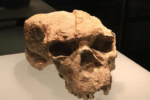U.S. Christians are asking Congress to act on behalf of victims of Islamic slavery
Americans are banding together to stop genocide and slavery in Sudan, where most victims are Christians who suffer persecution at the hands of a radical Islamic government headquartered in the capital city of Khartoum in Sudan’s north.
A broad coalition of churches, human rights groups and humanitarian organizations have united in the “Sudan Campaign” to petition the U.S. government to bring relief to Sudan’s southern population. An estimated 2 million people have died there in the last 17 years from civil war and forced starvation.
Much of the current interest in Sudan stems from reports that the north’s National Islamic Front planned to use oil revenue to build factories, missiles and tanks, which Sudan advocate Eric Reeves of Smith College in Massachusetts says would “better effect a final military solution to the racially and religiously driven conflict with…the south.”
A May report by the U.S. Commission on International Religious Freedom documented the atrocities in Sudan and called for congressional action. But the straw that broke the camel’s back was Secretary of State Madeleine Albright’s statement to Charles Jacobs of the American Anti-Slavery Group that nothing has been done in Sudan because the situation isn’t “marketable” to the American people. Jacobs and John Eibner, head of Christian Sol
idarity International (CSI), a humanitarian group, initiated the campaign in response to her challenge.
Campaign participants met in Washington, D.C., in late May and early June and included representatives from the American Jewish Committee, Salvation Army and the African American Women’s Clergy Association.
Among the attendees at a May 23 rally was Francis Bok Bol, a 21-year-old Sudanese Christian who told of his kidnapping at age 7 and 10-year enslavement. Members of Congress and Bishop T.D. Jakes also participated.
A group of fifth graders from Denver met at the Capitol June 8 to talk about their S.T.O.P. (Slavery That Oppresses People) campaign, through which the students have raised money to free Sudanese slaves.
And on June 9, supporters in 20 states held local observances in honor of National Sudan Day. More than 50 black pastors from Atlanta marched to the state Capitol to raise awareness about Sudan.
CSI reports that the fatalities in Sudan exceed the combined death toll from the wars in Kosovo, Bosnia, Rwanda, Somalia and Chechnya.”If the [United States] is going to continue to assume the role of ‘global police’ and
exercise our watch to ensure global well-being, we must not ignore the 911 call that comes from Sudan,” he said.
Rep. Tom Tancredo, R-Colo., member of the board of advisers for the Sudan Campaign, is a strong supporter of the Sudan Peace Act, which condemns the human-rights abuses in Sudan and calls for President Clinton or his successor to increase pressure on the Sudanese government and send relief into Sudan.
The bill was passed by the Senate in November and is awaiting passage by the House.
Tancredo is also among those encouraging a boycott of BP Amoco. The company has a 2 percent interest in PetroChina, whose parent company, the China National Petroleum Corporation (CNPC), is the largest investor in oil in Sudan.
BP Amoco acknowledged that 10 percent of revenue invested in PetroChina goes directly to the CNPC. But Michael Townshend, director of international operations for BP Amoco, added that within the company’s $580 million contract with PetroChina is an agreement that the CNPC stake must go into a separate account that will be used specifically in China. The CNPC account also will be audited quarterly, he said.
“We don’t want to see any of that money go toward purposes that we violently object to,” Townshend said.
Yet Reeves doesn’t believe their plan will work. “The money [CNPC] was going to have to use for domestic purposes [in China] can now go into international purposes,” he said.
Though the campaign is officially over, the momentum is still high. Marvin Williams of Garden of Gethsemane Ministries in Atlanta is hoping to redeem 2,000 Sudanese slaves by the end of 2000 and bring them to his city, where the “refugees” will be given jobs and lodging.
Joe and Peggy Raymond of Africa on Fire based in Virginia are working among black churches to get congregants to sign petitions, write their congressmen and the president, and visit their representatives in Washington. The Raymonds said five visits of two people each will get a congressman’s attention.





Leave a Comment
You must be logged in to post a comment.